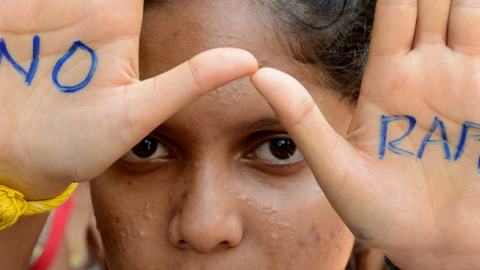Indians voice indignation over highly publicized incidents of rape, like the recent one in Delhi of a young woman by an Uber driver, but there is little public discussion of the socio-cultural context of the rape epidemic. Statistics from the National Crime Records Bureau show that on average 93 women are raped in India each day. The number of reported incidents of rape has steadily gone up over the years from 24,923 in 2012 to 33,707 in 2013.
The scale of India's rape problem indicates a deeper crisis of our civilization, one of the oldest in the world. India emerged as a modern state around six decades ago and has embraced modernity in the economic and political realms. But progress on the social front has been slow. Ancient and medieval patriarchal cultures turned a blind eye to rape, an attitude that seems to linger in otherwise modern India.
The Indian national movement was a struggle not only for political but also social and economic change. Attempts at social reform date back to the early 19th century with Raja Rammohan Roy, an educational and social reformer, who founded the Brahmo Samaj (societal component of Brahmoism), a monotheistic movement aimed at reforming Hinduism. It was the pressure of the Indian intelligentsia that led the British to implement sati reforms, aimed at ending the inhuman practice of a widow ('sati') immolating herself on her husband's pyre. Indian social reformers also demanded that the age for both child marriage as well as age of consent for sex should be raised.
The 19th century also witnessed a conservative backlash with organizations like the Arya Samaj (Noble Society), a reform movement which aimed to reestablish Hindu society as it was at the time of Vedas, which led a push back against attempts at social reform. The temple entry movement and caste reform, including the issue of untouchability, were pushed by Mahatma Gandhi for which he often faced ridicule and insult from conservative Hindus.
Even after Independence attempts at social reform by India's first Prime Minister Jawaharlal Nehru, like the Hindu Marriage reform act and other social reform bills, faced tremendous opposition. Thus it has often been easier for Indian politicians to push for political or economic changes than try to push a social agenda.
Even today we have a patriarchal feudal society and the attitudes of people and institutions reflect a certain worldview. When two young girls from Rohtak fought off men attempting to molest them on a bus, other passengers just sat and watched the incident happen. When the girls and their family attempted to lodge a police report, the police attempted to dissuade them. The men had been recently recruited by the army but under the gaze of media scrutiny their military service was terminated. However, the village to which the men belong came out strongly in their support demanding their release from prison as well as re-instatement by the army.
Politicians still threaten to use rape or sexual assault on their opponents just as decades ago the feudal landlords threatened their subjects. The coercive apparatus of the state -- the police -- prefers to dissuade victims from lodging complaints and is often the perpetrator of such crimes. The local village councils -- panchayats, khap [caste] panchayats or jirgas -- often see rape as one of the ways to implement justice. Women, young and old, are raped on the orders of these councils as punishment for a perceived offense by a member of their family. And finally the individual is taught that the honor of the women in the family is tied to their body; men have to protect it, women should not lose it.
This is reflected in the word used for rape -- izzat lootna or loss of honor. Why should rape be seen as a loss of honor instead of a crime? Women are told they are the ones responsible if they are assaulted or raped. So they should watch what they wear, where they go, whom they go with and what they do. Everything from wearing jeans and miniskirts to eating Chinese or non-vegetarian food can be held responsible for inciting men to sexually assault or rape a woman. Being out late at night or with a man to whom you are not related implies that you are a woman of loose morals and hence likely to be assaulted.
What we need is a change in attitude. In his August 14th speech this year Prime Minister Modi spoke on this issue when he asked people to treat their children the same way, whether it was a boy or a girl and furthermore asked them to be involved in what their son was doing because at the end of the day it was someone's son who would be involved in a sexual assault or rape.
Further, most Indian newspapers still report sexual assault under the phrase "eve teasing" which not only takes away from the crime but in a way comes under the same category as saying 'boys will be boys.' Some years back when some women protestors were raped in the northern state of Uttar Pradesh the local official stated in a press conference that if women walk through farm fields they are asking to be raped.
Another common reaction ever since incidents of sexual assault and rape have been reported is the oft-mentioned remark that if the media or people highlight these issues India's image is harmed or that it is hurting tourism. So again honor is the factor.
The problem India faces today is not simply of the verification of cabs or that of women to be wary of their surroundings but of how to change and modernize a patriarchal socio-cultural structure.

















